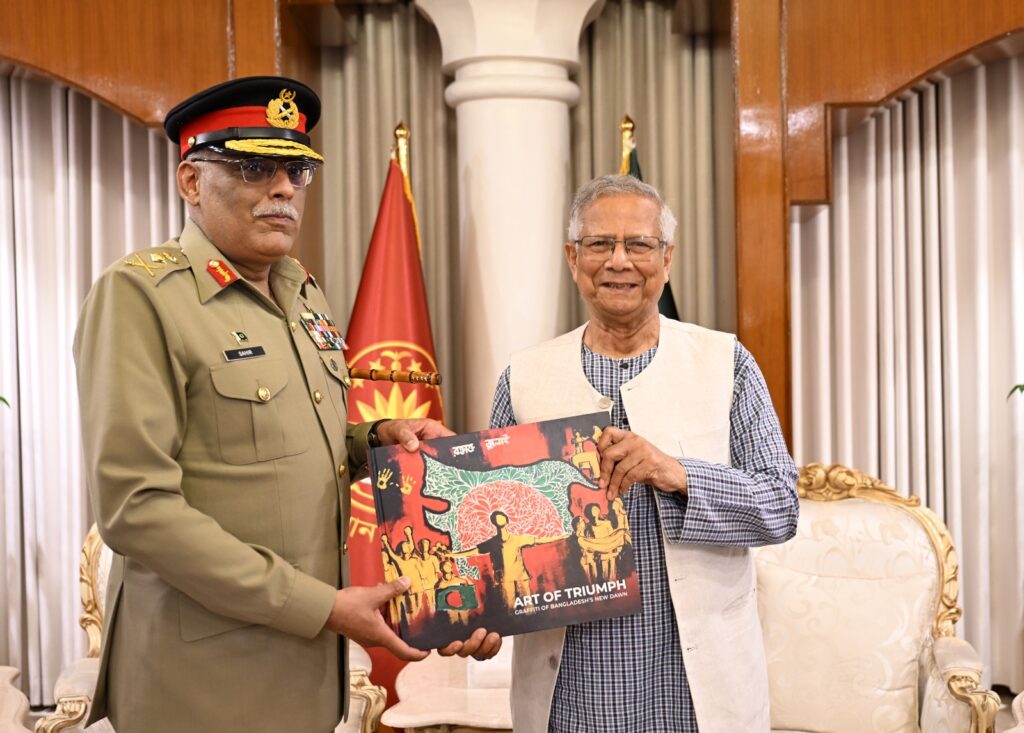Pakistan-Bangladesh relations have witnessed a remarkable transformation in recent months, marking what many observers call a historic diplomatic thaw between the two nations that share deep cultural and religious ties. The warming of bilateral ties comes at a pivotal moment, following Bangladesh’s signing of the July National Charter on October 17, 2025, which Chief Adviser Muhammad Yunus described as the “birth of a new Bangladesh.”
High-Level Military Engagement Signals Strategic Shift
The most significant indicator of improving Pakistan-Bangladesh relations came through the official visit of Pakistan’s Chairman Joint Chiefs of Staff Committee (CJCSC), General Sahir Shamshad Mirza, to Dhaka in late October 2025. This marked the highest-level Pakistani military engagement with Bangladesh in decades, demonstrating both nations’ commitment to rebuilding defense and security cooperation.
General Mirza’s visit included comprehensive meetings with Bangladesh’s top leadership, including Chief Adviser Dr. Muhammad Yunus, Chief of Naval Staff Admiral Mohammad Nazmul Hassan, and Chief of Air Staff Air Chief Marshal Hasan Mahmood Khan. During these discussions, both sides emphasized the importance of strengthening Pakistan-Bangladesh relations through expanded military-to-military engagements, training exchanges, and strategic dialogue.
Speaking to Chief Adviser Yunus, General Mirza declared, “Our two countries will support each other,” a statement that encapsulates the mutual commitment to deepening bilateral ties based on sovereign equality and mutual respect. The discussions covered the evolving global and regional security environment, with both nations expressing optimism about future cooperation.
Economic Connectivity: Maritime and Aviation Links
Beyond defense cooperation, Pakistan-Bangladesh relations have achieved tangible progress in economic connectivity. The most significant development is the launch of the first direct shipping route between Karachi and Chittagong in over five decades. This maritime link, which began operations in October 2024, has already transported over 1,000 containers and reduced transit times by 50 percent compared to traditional routes.
The direct shipping service connects the two nations in just 11 days, facilitating trade and reducing costs for businesses on both sides. Since the route’s inception, bilateral trade has grown by an estimated 27 percent between August and December 2024, demonstrating the economic potential of improved Pakistan-Bangladesh relations.
Building on this momentum, General Mirza announced that a Dhaka-Karachi air route is expected to open within the next few months. Pakistani carrier Fly Jinnah has already secured approval from Bangladesh’s Civil Aviation Authority to operate flights between the two capitals. This will mark the first direct air connection in over a decade, significantly enhancing people-to-people connections and business ties.
Strategic Context and Regional Implications
The revival of Pakistan-Bangladesh relations takes place against the backdrop of Bangladesh’s post-revolutionary political transition. Following the ouster of former Prime Minister Sheikh Hasina in August 2024 after 15 years of rule, the interim government under Muhammad Yunus has pursued a more balanced foreign policy approach.
Under Hasina’s tenure, Bangladesh maintained exceptionally close ties with India while keeping Pakistan at arm’s length. The new leadership’s pragmatic approach has created space for renewed engagement with Islamabad, based on mutual economic and security interests rather than historical grievances.
The July National Charter, signed by 25 political parties including the Bangladesh Nationalist Party and Jamaat-e-Islami, contains 84 reform proposals aimed at constitutional, electoral, and administrative reforms. This commitment to democratic governance and political stability provides a solid foundation for expanding Pakistan-Bangladesh relations.
Looking Ahead
Both nations have committed to establishing a Joint Business Council and reactivating the Bangladesh-Pakistan Joint Economic Commission after nearly two decades of dormancy. Pakistan aims to increase annual trade with Bangladesh to more than four times the current level within a year, an ambitious target that reflects the untapped potential of bilateral economic cooperation.
The establishment of defense cooperation frameworks, combined with operational trade routes, signals a fundamental shift in South Asian regional dynamics. As General Mirza’s visit demonstrates, Pakistan-Bangladesh relations are moving beyond symbolic gestures toward substantive cooperation in defense, trade, and strategic dialogue.
This diplomatic transformation represents a pragmatic approach to regional cooperation, where shared interests and geographic realities take precedence over historical complexities. The coming months will reveal whether this momentum can translate into sustained, institutionalized cooperation that serves the mutual interests of both nations and contributes to regional stability.



